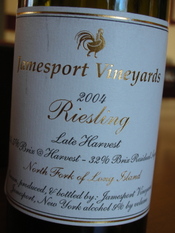
Long Island, and the entire state of New York really,
offers a surprising number of succulent, delicious dessert wines. In
upstate New York, there is an endless array of ice and ice-style
wines-some of which are frozen commercially while others freeze right
on the vine in the more traditional way.
But, on Long Island,
late harvest temperatures rarely dip down to the point where the grapes
freeze naturally, locking in water so that only the richest, most
flavorful liquid oozes from each berry when pressed. Instead, many of
the top dessert wines are made using grapes picked at peak ripeness and
then frozen in commercial freezers-often at facilities normally used
to freeze just-from-the-bay seafood.
That doesn’t tell the
whole story, however. The very growing conditions that make grape
growing on Long Island challenging can also at times give rise to Botrytis cinerea,
the mold responsible for perhaps the world’s best dessert
wines-Sauternes. And, for those fearless vineyard managers and
winemakers willing to ante up and gamble with the noble mold, the risk
is certainly outweighed by the reward of wines like this one.
A
rich, honeyed gold in the glass the complex, layered nose displays
classic botrytis notes-hay and honey-while also offering burnt sugar,
juicy peach and pear, and vanilla. Full-bodied and decidedly sweet,
significant, palate-cleansing acidity brings excellent balance and
keeps the wine lively. Honeyed fruit flavors are most prominent on the
forepalate, with vanilla and buttered-toffee notes lingering on a
lengthy, luxurious finish. It’s drinking well already, but this wine
should age for many, many years.
